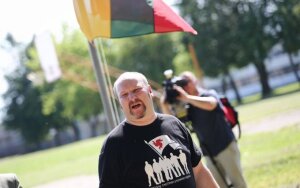- July 25, 2012
- 419
Nationalist youths’ camp in Dziewieniszki

The organisers of this year’s camp for youths with nationalist views have changed their motto from “Proud and Baltic”, which was in use up to this year, to “Thank God for Baltic roots”. Youths from both Latvia and Lithuania participate in the event.
The motto was changed after a statement made last year by the prime minister of Lithuania Andrius Kubilius. He said that the motto which states “Proud and Baltic” has an ambiguous meaning and can be misinterpreted. This is because the Lithuanian word “baltas” can mean two different things: a person of Baltic origin or someone of white ethnicity.
One of the camp organisers, Julius Panka stated: “We corrected the motto a little so that even the prime minister can understand everything fully, as we noticed that he doesn’t always understand things. Currently our motto reads “Thank God for Baltic roots” („Ačiū Dievui (-ams) už baltišką kilmę) and there will be no institutions that can pick on us, even though that in Lithuania everyone is looking for enemies and are trying to cause a fight“.
The organiser of the camp is the Lithuanian Association of Nationalist Youths (Lietuvos tautinio jaunimo sąjunga). The camp was also financially supported by the Culture Support Fund (Kultūros rėmimo fondas). Tomorrow the camp is to be visited by the advisor of the leader of the lower house of the Lithuanian Parliament, Laurynas Kasčiūnas who may possibly be joined by MP Gintaras Songaila. The camp participants received regards from MP Gediminas Navaitis and a liguist Kazimieras Garšva. The gathering is to last until Sunday.
According to Panka, the main aim of the camp is to encourage dialog between youths in Baltic languages. “The camp is dedicated to Baltic languages thus we hope that the participating children and youths will not speak English, Russian or Italian amongst themselves if they meet up for example in Latvia for shopping or a coffee. We also say that people are welcome to communicate in Baltic languages even when facing difficulties because then gestures can replace the spoken word when explaining things.” – Julius Panka explains.
Source: http://pl.delfi.lt/aktualia/litwa/oboz-mlodziezy-narodowej-w-dziewieniszkach.d?id=59181981
Tłumaczenie Kamil Szwarc w ramach praktyk w Europejskiej Fundacji Praw Człowieka, www.efhr.eu. Translated by Kamil Szwarc within the framework of a traineeship programme of the European Foundation of Human Rights, www.efhr.eu.

